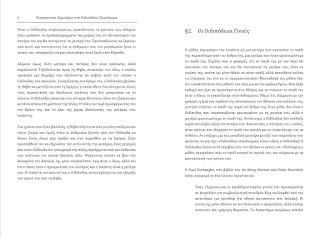[Psychoanalytic Reading: On Lacan's Praying Mantis]
you may download the paper here
Psychoanalytic experience reveals that the subject pursues her fantasy, believing that it will bring her ultimate enjoyment. Yet, however much the subject in her symptom is after that enjoyment, nevertheless the fantasy is not something that the subject truly wants to achieve; for, not only this pursue brings anxiety, but also when it is realised the result is undesirable or even devastating for her.
Fantasy brings enjoyment, but only when it is in the control of the subject. This is why the subject rebels if that enjoyment is imposed by the Other via a specific demand. An analysand, for example, wakes up eager to do chores around the house, but before she starts, she hears her mother ordering her to do so, and as a result she becomes indignant and gives up. In a different incident, another analysand, during her session, describes how anxious she is when she is looked by someone, where she tries to put herself in the role of how she imagines that the other person sees her, for example “cool” and “impressive”. However, when the viewer compliments her that she is impressive, she reacts rudely and tells him to go to hell, believing he wants something from her. As long as the Other's desire remains elusive, the subject tries to guess it by acting according to how she assumes that desire, in other words, by fulfilling it! The analysand herein answers the enigma of the Other's desire according to her fantasy in which she appears impressive. But once the Other is revealed through the compliment, the desire falls into a specific demand, namely, how the Other wants to see her, which is unbearable for her. The analysand believes that the Other wants something from her because he has just disclosed it to her, i.e. that he enjoys her as the object of his gaze, as impressive. With her acting, she tries to lure the Other into openly stating how he sees her so that she then denies her position as an object. But the real lure is the one which she had primarily surrendered herself to, the lure of language forming the fantasy of the “impressive”, where she has already become a captive of the Other by giving up her desire – a fantasy that she then projects onto the Other in order to place all the blame on him.
In fantasy, the subject puts the responsibility of her desire on the Other. With this move, not only does she lay her desire on the Other from whom she then tries to receive it back (the desire becomes the Other's desire), but also what she gets back, i.e. the fantasy, is something she does not desire, which means that the desire is negativized.
Fantasy is the paranoid means by which the subject interprets desire as the desire of the Other, that is, how she embraces the Other who is alien, a radical otherness, ξένος, making it her home. This is how we reach Lacan’s formula that “[m]an’s desire is the desire of the Other”[1]. Let's bear in mind that the Other is language itself, even if it takes various forms in the persons who introduce it to the speaking being through enjoyment, i.e. the family who familiarises the child with language, as the language of enjoyment. The subject forms a relationship of enjoyment with the Other, in such a way that she keeps close to the Other but at the same time avoids being grasped (as an object) by him. This is precisely the function of the symptom, as a staging by which the subject approaches the fantasy, yet when she approximates its realisation she diverts from it, in order to repeat the same cycle again. However, when the aforesaid relationship with the enjoyment of the Other is actualised, it wreaks havoc on the subject! This is exactly what the myth of Oedipus tells us[2]. In the realization of the fantasy nothing remains of the subject but only an object of the Other, i.e. it means death for the subject as desire. In the realization of the fantasy, language, which gives body to the subject, takes it away : The analysand that defined her life with the signifier “impressive” meets her death there! The subject is devoured by the Other, she is annihilated in language.
Lacan refers to this very thing when he develops the topic of anxiety that occupies the subject when she encounters the object. He speaks of the anxiety in the face of the desire of the Other, using an allegory where the subject is standing next to a female praying mantis, with twice the subject's size[3]. The subject is wearing a mask, but she, the subject herself, does not know what the mask is, whether it makes her look like a prey, or worse, whether it is a mask of a male praying mantis, whose head is known to be eaten by the female after their sexual intercourse. The subject, Lacan says, is seized with anxiety in the face of the Other's enigmatic intentions. But what he does not say, and I believe that its importance needs to be emphasised, is that in order to be eaten as a male praying mantis, she must have already mated with the Other, for it is only after the coition that the male is beheaded. This means that in her fantasy the subject has already “coupled” with the Other and what remains is the coup de grace (or the mercy of the predator), in other words, the realisation of the fantasy. The subject is in danger by the intentions of the Other only when she submits to the lure of the Other's enjoyment.
[1] Jacques Lacan, The Four Fundamental Concepts of Psychoanalysis, The Seminar of Jacques Lacan Book XI, Ed. Jacques-Alain Miller, Transl. Alan Sheridan, New York: W.W. Norton & Co, 1981, p.235.
[2] See Angelos Tsialides, Oedipus, Cosmogony and the Alien, Limassol: Scribe of the Letter, 2023, and Άγγελος Τσιλίδης, Κοσμογονία: Σεμινάριο στο Οιδιπόδειο Σύμπλεγμα, Λεμεσός: Scribe of the Letter, 2023.
[3] Jacques Lacan, Identification, The Seminar of Jacques Lacan Book IX, Transl. Cormac Gallagher, unpublished, Session 16: 4.4.1962. Also, Jacques Lacan, Anxiety, The Seminar of Jacques Lacan Book X, Ed. Jacques-Alain Miller, Transl. A. R. Price, Cambridge: Polity, 2014, p. 5.

















